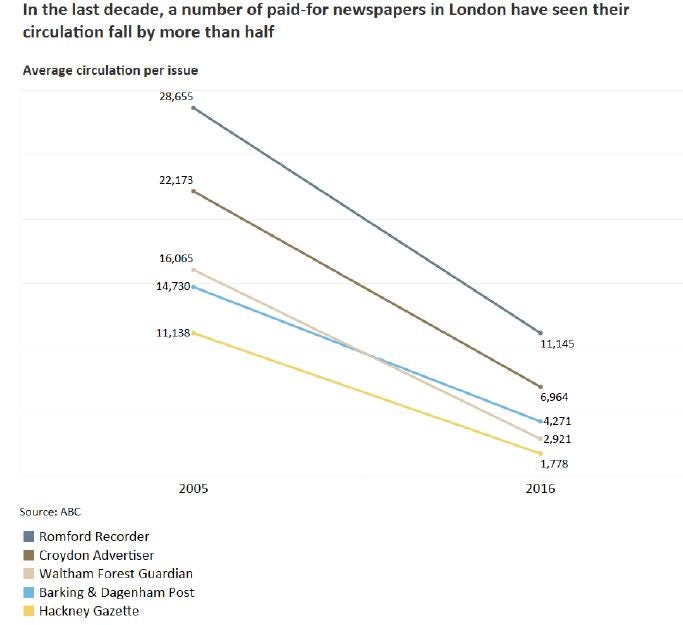
A London Assembly report on the provision of local news in the capital has warned of a “democratic deficit” if coverage continues to be scaled back through paper closures and staff cuts.
The Economy Committee report, published today and titled: “The fate of local news – read all about it”, shows that circulation figures for five of London’s paid-for local papers fell by more than half from 2005 to 2016.

- Source: “The fate of local news – read all about it”
Three of these titles are owned by regional publisher Archant – Romford Recorder, Barking & Dagenham Post, and Hackney Gazette – which also saw the only year-on-year growth in paid-for local paper circulation last year at the Ilford and Romford Recorder titles, according to the report.
Linda Quinn, editor-in-chief of independent newspaper the Brixton Bugle, told the committee there was “the real potential for a democratic deficit as a result of a lack of local community reporting”.
She said if people “do not know what is happening in their name, it is very difficult to form a judgment to hold the council to account”.
The report also said that as circulations dwindle and newsrooms shift focus to online there is “evidence of less ‘on-the-ground’ news reporting or investigative journalism” as a result.
Hannah Walker, editor-in-chief at South London Press, told the committee: “We have to make more informed choices… I cannot afford to lose a reporter for three days not being productive. I need some copy because we have deadlines and we need to get papers out.”
Eric Gordon, editor of the Camden New Journal Group, added: “The fact is that over the years there are fewer journalists and therefore, of course, what you call investigative reporting is now much less often done than it used to be years ago. There is little doubt about that.”
The report said that the fall in advertising income had “hit the revenues of local newspapers the hardest”.
“Before the growth of the internet, local newspapers relied on classified advertising for a large proportion of their income. Rupert Murdoch once described classified advertising revenue as “rivers of gold”.
“But as advertising has migrated online – mainly through Google or Facebook, but also through specialist property, car and job sites – the income it generates for print media has fallen.”
Figures quoted in the report from the Advertising Association and marketing intelligence service WARC show that spending on regional newspaper advertising fell by 17 per cent between 2014 and 2016.
The City Hall report is published after a string of local newspaper closures in London in recent months, prompting the National Union of Journalists (NUJ) to warn of a “real crisis” in the city’s news coverage.
Tindle Newspapers closed three north London local titles in July while a buyer for four titles previously owned by Capital Media Newspapers is still being sought.
Last week, Trinity Mirror said it was reviewing the future of The Wharf paper, covering Canary Wharf and the Docklands.
The report said: “London needs a strong and credible local press. Without addressing the challenges the industry is facing, and finding solutions, we are at risk of losing one of our most important democratic functions.
“Action needs to be taken now to change the path for local newspapers. The decline of the industry and its impact on the workforce is leading to a less-credible news source.
“Hyperlocal news sources are a great addition to the industry, but questions remain about their ability to survive as they are often reliant on volunteers and can struggle to get reliable sources of funding.”
Recommendations made in the report include offering local newspapers on select London bus routes “to ensure that groups who are digitally and news-excluded have access to local news”.
The committee also calls on the London Mayor to ensure that London-based news outlets pay all staff “at least the London Living Wage”, as well as establish a digital journalism apprenticeship and work to fund bursaries for journalists to “tackle the lack of diversity in local news”.
Fiona Twycross AM, author of the report, said: “Having an active local news force is essential to ensure we are able to hold to account Government, local councils and other organisations that have huge responsibilities to Londoners.
“We’ve seen a flurry of job losses and local news publications go under recently and this is a worrying trend. Local news must be protected. As local news publications look to the future, it is essential that we don’t leave those who are digitally excluded behind.
“Urgent action is needed to support local news and the Mayor of London can show real leadership in standing up for local news at this critical time.”
The National Union of Journalists welcomed the report, with acting general secretary Seamus Dooley saying “its warnings must be headed”.
He said: “The NUJ would be happy to explore all proposals with the mayor. We believe there is already a democratic deficit – and not just in London.
“Many media organisations have imposed severe cuts in editorial budgets; they no longer cover local authorities and investigative journalism is perceived as an expensive luxury rather than a necessity.
“London needs journalists who earn enough to afford to live in the capital and who represent the great diversity of this city.
“The demise of local media is not inevitable; newspapers need to invest in editorial resources to survive. The support for our Local News Matters campaign shows the decline of the press need not be a self-fulfilling prophesy.”
The Government’s Local News Partnership, an agreement between the BBC and the News Media Association, will fund 150 local democracy reporters in a bid to help plug the so-called “democratic deficit”.
Picture: Pixabay
Email pged@pressgazette.co.uk to point out mistakes, provide story tips or send in a letter for publication on our "Letters Page" blog
